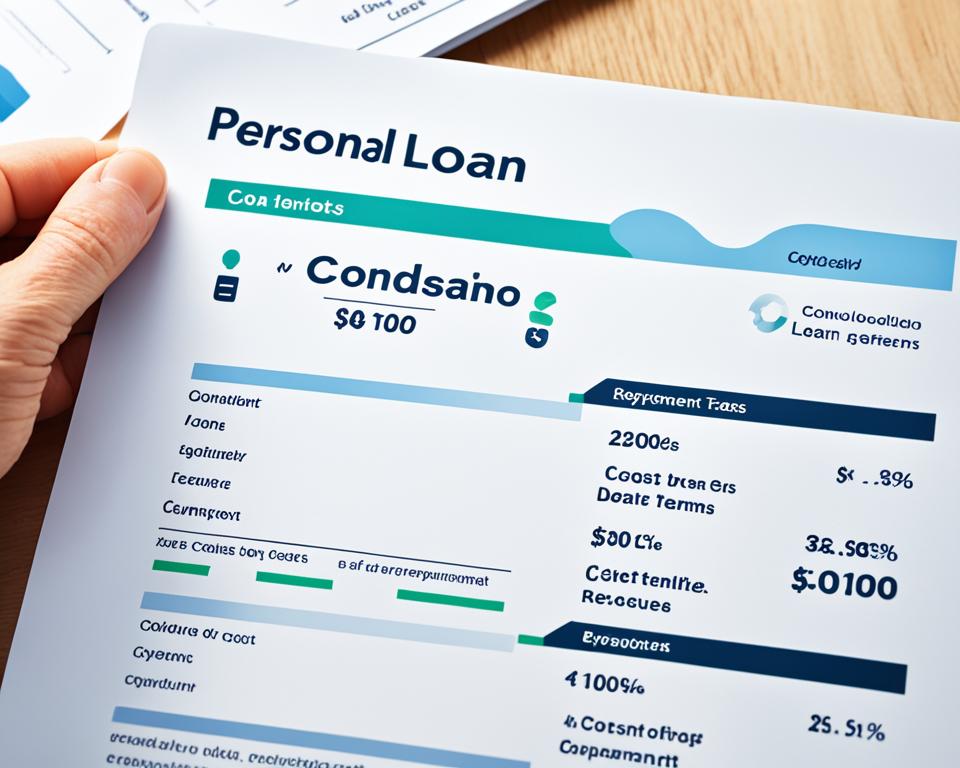In the United States today, navigating the challenges of financial stability has become a concern for many. With rising inflation and interest rates, managing one’s finances efficiently is more crucial than ever. As Americans grapple with these economic pressures, personal loans for debt consolidation emerge as a significant lifeline. These financial instruments not only provide relief but pave the way toward achieving a more harmonious financial state. The goal is transmuting multiple high-interest obligations into a single, streamlined payment, a strategy that has proven both constructive and practical.
Entering the arena of debt consolidation solutions calls for an astute understanding of the options available. For many, the best personal loans for debt consolidation serve as the bulwark against the torrents of burgeoning debts. By electing to consolidate debt with a personal loan, consumers can potentially unlock lower interest rates and better repayment terms, thus gaining crucial ground in the battle for financial serenity.
Key Takeaways
- Personal loans for debt consolidation can be a strategic response to rising household debts under economic inflation.
- Consolidating multiple debts into one can offer lower interest rates, simplified payment schedules, and a pathway to financial relief.
- Understanding the terms and benefits of the best personal loans for debt consolidation helps in making a well-informed decision.
- The process of consolidating debt involves comparing lender offers, assessing financial circumstances, and choosing the right loan structure.
- A successful consolidation plan should align with one’s overall financial goals and pave the way towards sustainable economic health.
Understanding the Surge in American Household Debt
The American financial landscape has undergone profound changes in recent years, marked by **economic challenges** that have led to an unprecedented surge in **American household debt**. In the second quarter of 2022 alone, there was a staggering increase of $312 billion, pushing the total household indebteness to a momentous $16.5 trillion. This figure not only exemplifies the fiscal impact of inflation but also marks a considerable $2 trillion increase from the pre-pandemic era.
This substantial growth in debt across American households underscores the importance of effective **financial management** strategies. Among these, debt consolidation loans have emerged as a pivotal tool, offering a streamlined approach to managing multiple debt channels under one umbrella. As consumers navigate through the tides of economic uncertainty, such strategic financial solutions can provide a lifeline for managing repayments and ultimately alleviating the financial burden.
Let’s delve into a comparison of typical American household debt before the pandemic and now.
| Debt Type | Pre-Pandemic Level | Current Level | % Increase |
|---|---|---|---|
| Credit Card | $1.08 trillion | $1.12 trillion | 3.7% |
| Student Loan | $1.45 trillion | $1.57 trillion | 8.3% |
| Auto Loan | $1.33 trillion | $1.43 trillion | 7.5% |
| Mortgage | $9.60 trillion | $10.44 trillion | 8.7% |
The table reveals a clear trend: debt across various sectors has grown significantly, with the largest percentage spike observed in student and mortgage loans. This development highlights the necessity for effective instruments such as debt consolidation loans to combat these rising figures and offer relief to the American public under financial duress.
As households face the squeeze of inflation and its resulting challenges, the role of informed financial decision-making becomes ever more critical. Identifying and utilizing debt consolidation as a strategic option could make the crucial difference in mitigating current **economic challenges** and moving towards stable financial ground.
The Fundamentals of Debt Consolidation with Personal Loans
In the landscape of financial strategies, debt consolidation with personal loans stands out as a beacon for those navigating the rocky seas of multiple debts. This approach not only aims to simplify debt management but also introduces the potential for more benign financial terms.
What Is Debt Consolidation and How Can It Help?
At its core, debt consolidation involves combining various debts into a singular loan, typically one with a lower interest rate. This streamlined method of repayment serves to lessen the burden that comes with juggling several high-interest debts, such as those incurred by credit cards, medical bills, or payday loans. Simplifying the repayment process, it can significantly ease the financial stress on individuals, enabling a clearer path towards fiscal stability.
The Role of Personal Loans in Debt Management
Personal loans for debt consolidation play a pivotal role in debt management, offering a structured and potentially cost-reducing avenue for individuals to regroup their financial obligations. Expert voices in the financial advisory sphere, like Michael Sullivan from Take Charge America, champion these tools for their ability to consolidate multiple payment schedules into one and for the possibility of securing much-needed lower interest rates and more favorable payoff terms. A loan for consolidating debt can serve as a lifeline for many, paving the way towards a future free from the fetters of fragmented debt repayments.
Selecting the Right Debt Consolidation Loan
Finding an optimal debt consolidation loan is a journey that requires evaluation and foresight to ensure you embark on a path toward financial relief and stability. One must diligently compare personal loans for debt consolidation, considering not just the appeal of low interest personal loans, but also the full scope of consolidation loan terms. Starting with a comparison of interest rates is critical, followed by an in-depth assessment of loan terms and potential fees.

Comparing Interest Rates Across Lenders
It’s imperative to canvass the landscape of available lenders, as each may offer varying interest rates that could significantly affect the overall cost of your consolidation loan. Methodical comparison is not only about securing the lowest interest rate but also about understanding how that rate interacts with the loan’s term and your personal repayment capacity.
Evaluating Loan Terms and Fees
Equally vital to the loan selection process is a thorough analysis of the terms and fees associated with each loan option. This requires a granular look at not only the monthly repayments but also at any upfront charges, closing costs, or penalties that could inflate the overall expense. To aid with these comparisons, the following table provides a viewpoint into what one might expect when scrutinizing different loan offerings:
| Lender | Interest Rate Range | Loan Term Variety | Origination Fee | Prepayment Penalty |
|---|---|---|---|---|
| Lender A | 5.99% – 24.99% | 2 – 7 years | 1% – 5% of loan amount | None |
| Lender B | 6.99% – 18.99% | 3 – 5 years | None | None |
| Lender C | 7.99% – 23.99% | 3 – 6 years | $150 flat fee | 2% if paid in first year |
By engaging with different lenders to receive prequalified offers, you step into a prepared state to compare each prospect and identify the loan that best accommodates your particular financial situation without detrimentally affecting your credit score. This information, coupled with an understanding of your personal financial situation, helps chart a confident course toward an effectively managed debt consolidation.
How to Leverage Low Interest Personal Loans
In the quest for effective debt management, low interest personal loans stand out as a beneficial tool. These loans are designed to help individuals consolidate debt with a personal loan, potentially replacing multiple high-interest debts with a single loan that carries a lower interest rate. Understanding how to secure and utilize these loans is crucial for anyone looking to improve their financial landscape.
To begin the process, it’s important for borrowers to assess their credit standing, as this often influences the interest rate and terms they will receive. High credit scores generally lead to more favorable loan conditions. To this end, exploring various lending options is advisable, with a focus on those who offer the most attractive interest rates. Let’s delve further into how one can efficiently maneuver this financial strategy.
Shopping for personal loans requires comparing offers from several financial institutions. This may include traditional banks, credit unions known for their competitive rates, and the increasingly popular online lenders that offer a convenient application process and quick access to loan comparisons.
- Banks: They often provide personal loans with competitive interest rates for existing customers and may offer benefits such as rate discounts for auto-payment setup.
- Credit Unions: Members can benefit from personalized service and potentially lower rates due to their not-for-profit status.
- Online Lenders: These platforms allow for expedient rate comparisons and may offer more lenient qualification criteria, especially catering to tech-savvy borrowers looking for simplicity.
When comparing loan offers, it is crucial to consider not just the interest rates but also the loan duration, fees, and the total amount repayable. Borrowers must ensure the loan terms align with their debt reduction goals and their ability to meet monthly payments without financial strain.
The aim is to find a balance between a manageable monthly payment and a loan term that will not unnecessarily extend the repayment period or increase the total interest paid. Once a suitable loan is identified, the final step involves a comprehensive application process and, upon approval, the strategic application of the funds to existing debts.
Consolidating debt with a personal loan should be part of a broader debt management plan that includes budget adjustments, cost reductions, and a strong commitment to avoiding further debt accumulation, ensuring a healthier financial future.
The Benefits of Best Personal Loans for Debt Consolidation
As the financial landscape shifts, debt consolidation personal loans stand out as a compelling solution to streamline finances. Not only do these loans provide a way to potentially lower your interest rates, but they also offer the convenience of consolidating various debts into one manageable payment. This consolidation strategy is proving beneficial for individuals seeking a solid path toward financial stability and debt freedom.
Reducing Your Interest Payments
One of the primary financial benefits of personal loans lies in their capacity to reduce interest payments. This is particularly advantageous for those grappling with high-interest liabilities such as credit card debt. By securing a loan with a lower interest rate, overall costs of financing are noticeably diminished over time, leaving more money in your pocket.
Streamlining Monthly Payments
Additionally, debt consolidation personal loans aid in organizing your financial life by turning multiple monthly obligations into a single payment. This simplification process not only helps to avoid late or missed payments but also fosters a more disciplined approach to personal budgeting. A structured repayment plan with fixed amounts and dates significantly reduces the hassle associated with juggling several debts each month.
| Benefits | Description | Impact |
|---|---|---|
| Lower Interest Rates | Consolidation loans often have lower rates compared to credit cards. | Reduced long-term debt expense. |
| Simplified Payments | Multiple debts are merged into one single payment. | Enhanced manageability and payment discipline. |
| Credit Score Improvement | Decreased credit utilization through consolidation. | Potential for improved credit ratings over time. |
| Finite Repayment Plan | Closed-end credit gives a clear timeline for debt clearance. | Aids in setting and achieving financial goals. |
Through the strategic use of a debt consolidation loan, individuals are empowered to take control of their fiscal situation. Opting for one of the best personal loans for debt consolidation not only helps to reduce the weight of debt but also paves the way for sound financial planning and a future free of debt burdens.
A Step-by-Step Guide to Consolidating Debt
When you find yourself managing multiple debts, a logical approach to streamline your finances is through consolidation. This guide to consolidating debt will walk you through the essential steps, from initial exploration to the formalities of the loan application process.
Getting Prequalified and Shopping Around for Offers
To embark on this financial journey, the first step is to get prequalified for a loan. This preliminary phase is crucial as it gives you a glimpse of the potential offers without any negative impact on your credit score, thanks to what’s known as a soft credit inquiry. Borrowers can freely compare interest rates, repayment terms, and other critical features across various lenders, enabling a broad assessment without any commitments.
Understanding the range of offers available allows you to make an informed decision when selecting the most beneficial consolidation path. Important variables to consider include the length of the loan, associated fees, and, of course, the interest rate. Be sure to assess how these factors align with your personal financial situation and long-term objectives.
The Loan Application Process Demystified
After identifying the right offer, the next step is to complete the debt consolidation loan application. This stage moves beyond mere estimates and involves providing lenders with comprehensive financial details. Expect to supply documentation verifying your income, employment status, and existing debt obligations. This in-depth scrutiny allows lenders to make final loan approval decisions and set accurate loan terms tailored to your financial profile.
Ultimately, a successful application results in either the direct provision of funds to you or the lender undertaking the responsibility of paying off your existing debts. This is a significant milestone in your journey to financial stability, as it simplifies multiple debt streams into a single, manageable loan.

In the table below, we illustrate the comparison factors you should assess when shopping around for loan offers:
| Lender | Interest Rate | Loan Term | Monthly Payment | Fees |
|---|---|---|---|---|
| Lender A | 5.99% | 24 months | $450 | No origination fee |
| Lender B | 7.50% | 36 months | $320 | $150 origination fee |
| Lender C | 6.25% | 48 months | $260 | $200 prepayment penalty |
When considering the figures above, think about not just the immediate monthly impact but also the long-term costs associated with each loan option. Armed with this information, you’ll be prepared to tailor the debt consolidation process to your specific circumstances, ensuring that you make the right move towards conquering your debt.
Personal Loans for Debt Consolidation
Seeking out personal loans for debt consolidation has become a smart financial move for those aiming at financial stability. These loans offer a means to organize multiple debt payments into one, streamlining one’s financial commitments under more appealing loan terms. Not all loans are created equal, however, and finding the right terms to promote long-term stability is key.
Fixed interest rates are a hallmark of many personal consolidation loans, providing the assurance of steady repayment plans. This stability is a boon for budgeting, allowing borrowers to plan their finances with confidence. Although personal loans for debt consolidation might shimmer with promise, potential borrowers are advised to conduct a deep dive into the nitty-gritty details of their loan agreements.
Borrowers must meticulously review loan contracts for any hidden clauses, such as teaser rates, that could lead to unforeseen hikes in interest, impacting the cost-effectiveness of a loan after an introductory period.
It’s crucial to choose lenders known for their integrity and openness. Transparency in the loan terms should be a top criterion during the selection process. Weighing options carefully allows borrowers to make decisions that align with their financial goals and avoid those appealing yet misleading offers that can derail their journey towards debt freedom.
When considering a personal loan for debt consolidation, the table below lays out key factors to consider:
| Factors to Consider | Importance | Details to Check |
|---|---|---|
| Interest Rate | High | Fixed rates can offer predictability; check if the rate increases after a certain period. |
| Fees | Medium | Origination fees, prepayment penalties, and late payment fees can add to the cost. |
| Repayment Term | High | Longer terms may lower monthly payments but increase total interest; shorter terms do the opposite. |
| Lender Reputation | High | Seek lenders with positive reviews and transparent practices for a secure borrowing experience. |
| Early Payoff Options | Medium | Some loans provide flexibility without penalties for early payoff; this can save on interest over time. |
| Monthly Payment | High | Ensure the payment amount aligns with your budget to maintain on-time payments and credit health. |
Finding the right personal loan for debt consolidation is a step toward financial freedom. With due diligence on loan terms and a steadfast approach to repayment, borrowers can harness these loans to realign their financial trajectory.
Exploring Online Personal Loan Options and Their Advantages
As the financial landscape continues to evolve, online personal loan options have become increasingly popular for those seeking financial flexibility and solutions to manage their debts. The rise of digital lending platforms offers a myriad of debt consolidation loans, each with its own set of benefits tailored to the modern consumer’s needs.
One of the key advantages of online loans lies in the streamlined process of prequalification. Prospective borrowers can access a plethora of loan offers with just a few clicks, significantly reducing the time and effort required to shop for the best rates. This not only provides convenience but also preserves the borrower’s credit score from the potential impacts of hard credit inquiries.
Online personal loans bring the power of choice directly into the hands of the consumer, delivering an unprecedented level of autonomy in managing personal finances.
Financial flexibility is further exemplified in the variety of loan terms available through online platforms. From short-term solutions to long-term consolidation plans, online lenders cater to a broad spectrum of financial situations, ensuring that borrowers can tailor their loan to their specific needs.
- Quick and easy prequalification for loan options
- Transparent comparison of interest rates and fees
- Customizable loan terms for personal financial goals
- Convenience of managing loan applications from home
Online loan providers often feature user-friendly interfaces, detailed FAQs, and customer support to guide borrowers through the process, underscoring the seamless nature of acquiring an online personal loan. The ability to obtain funds remotely and efficiently taps into the modern consumer’s desire for services that provide both value and ease, positioning online personal loan options as a logical choice for those aiming to consolidate debt and enhance their financial health.
Key Considerations When Consolidating Debt with a Personal Loan
When contemplating the use of debt consolidation personal loans as a financial tool, two primary factors emerge as pivotal to success: the credit impact of restructuring debt and the integration of such loans into robust financial planning to achieve long-term goals.
Credit Impact and Utilization Rates
The transition from multiple debt accounts to a singular personal loan for debt consolidation can be beneficial to your credit report. This consolidation process typically results in lower credit utilization rates, contributing to an improvement in credit scores. However, this is subject to continued prudent financial behavior and consistent repayment.
Financial Planning and Meeting Long-Term Goals
Aligning the repayment structure of a personal loan with your financial aspirations is essential. A comprehensive financial plan that includes debt consolidation should address not just immediate relief from high-interest debts but also position you to meet your future financial milestones. This strategic planning ensures that today’s solutions do not become tomorrow’s burdens.
Incorporating a debt consolidation personal loan is more than a mere transaction—it is a commitment to financial discipline and a stepping stone towards fiscal resilience and independence.
Navigating Debt Consolidation Solutions During Inflation
In the midst of rising costs due to economic challenges, individuals are increasingly turning to debt consolidation solutions to manage their financial obligations. With inflation impacting every aspect of daily life, from grocery bills to gas prices, consolidating multiple debt payments into one can offer some respite. A well-thought-out approach to financial planning is more crucial than ever to mitigate the stress of an overburdened budget.
Debt consolidation is not a one-size-fits-all remedy and requires careful consideration of various factors to determine its viability for each person’s unique circumstances. It’s about developing a financial strategy that is responsive to the current economic environment and tailored to long-term financial health. Below is an outline of the key aspects to evaluate when considering debt consolidation amid inflationary pressures.
- An assessment of current debts and interest rates
- Comparison of debt consolidation loan offers
- Impact of consolidation on monthly payments and overall financial commitments
- Long-term benefits and potential risks given the economic forecast
The goal of debt consolidation during these challenging economic times is to provide breathing space in your budget, not just for immediate relief, but as a strategic move towards lasting financial stability.
To illustrate the financial dynamics of consolidating debts, let’s consider a comparison table of unconsolidated debts versus a consolidated option:
| Debt Type | Interest Rate | Monthly Payment | Remaining Balance |
|---|---|---|---|
| Credit Card A | 22% | $200 | $5,000 |
| Credit Card B | 18% | $150 | $3,000 |
| Personal Loan | 15% | $180 | $4,000 |
| Consolidated Loan | 12% | $450 | $12,000 |
The table above depicts how a consolidated loan could reduce the overall interest rate and monthly payment obligations, leading to possible savings amid the financial squeeze of inflation. Of course, it’s imperative to consider the tenure of the loan, potential fees, and the credibility of the consolidation provider.
In times of economic challenges, every decision has more significant consequences, and the choice to consolidate should be made with foresight. Completing a thorough review of one’s financial situation, paired with expert advice, can pave the way to more manageable monthly expenses despite the rising tide of inflation. In essence, well-designed debt consolidation solutions are not just about battling the present; they are about planning for a stable financial future.
Top Lenders for Debt Consolidation Personal Loans
Seeking the best financial solution for debt consolidation begins with identifying top lenders for debt consolidation personal loans. These lenders are distinguished by their financial trustworthiness and solid lender reputation. It’s imperative for borrowers to prioritize these attributes when choosing a lender to secure favorable loan terms.
What to Look for in a Lender
When you’re on the hunt for a reputable lender, the key aspects to focus on include the lender’s track record of industry compliance and customer satisfaction. Conducting diligent research into their past dealings, confirmation of licensing, and any accolades or sanctions received can shed light on their operational integrity. Renowned finance expert, Michael Sullivan, advises borrowers to consult the Better Business Bureau to gain insights into a lender’s standing in the industry.
Understanding Fees and Rates Among Top Lenders
Unlocking the best terms for your debt consolidation necessitates a thorough comprehension of associated fees and interest rates. Factors such as origination fees and prepayment penalties must be underscored when determining the overall cost of your loan. This careful examination will not only prevent any unwelcome surprises but also ensure that the consolidation serves its intended purpose effectively.
The Impact of Consolidating Credit Card Debt on Your Financial Health
When grappling with high-interest credit card balances, consolidating credit card debt is touted as a beacon of hope towards financial health. This strategic financial decision involves replacing multiple credit card debts with a single, typically lower-interest loan, paving the way for economic stability and ease in management.
Let’s delve into how consolidating your credit card debt could affect your financial journey:
- **Interest Rate Reduction:** Moving debt to a lower interest rate loan significantly decreases the amount paid over the life of the debt, reducing overall financial strain.
- **Monthly Payment Streamlining:** Having one monthly payment, as opposed to several due on different dates, simplifies personal budgeting and reduces the likelihood of missed payments.
- **Credit Score Improvement:** As credit card balances dwindle, credit utilization ratios improve, potentially boosting credit scores.
- **End-Goal Clarity:** With one fixed loan repayment plan, you are positioned to formulate clearer timelines for becoming debt-free.
The following table outlines how consolidation can enhance your financial outlook:
| Before Consolidation | After Consolidation |
|---|---|
| Multiple high-interest debts | Single lower-interest loan |
| Varied monthly payments and due dates | One monthly payment on a set date |
| High credit utilization rate | Lower credit utilization rate |
| Uncertain timeline to debt freedom | Defined path to paying off debt |
Despite the apparent benefits, the true impact on one’s economic stability depends on the diligence exercised in the consolidation process. It’s crucial for individuals to refrain from accruing new debts and to maintain a disciplined repayment strategy. By doing so, consolidating credit card debt can be a cornerstone in restoring, maintaining, and enhancing one’s financial health, as they step firmly towards a more economically stable future.

Loan for Consolidating Debt: Smart Use Strategies
When you decide to consolidate debt with a personal loan, implementing smart financial strategies can turn that decision into a catalyst for financial stability and success. The art of loan utilization is critical, starting with a disciplined focus on using the loan strictly for paying off existing debts.
Not every loan for consolidating debt is crafted equally. It’s recommended that you consider these foundational strategies to make the most out of your debt consolidation:
- Direct all funds from the consolidation loan towards extinguishing multiple debts.
- Avoid using your newly available credit lines, thus steering clear from accruing additional debts.
- Commit to a fixed repayment strategy to ensure the loan is paid off within the stipulated timeline.
- Maintain a stringent budget post-consolidation to mitigate the risk of future financial strain.
By following these simple, yet effective, steps, you are not just consolidating your debts—you’re embarking on a journey towards sustained financial wellness.
Consolidation isn’t simply about paying off debts—it’s an opportunity to reset your financial mindset and cultivate habits that prevent debt from reoccurring.
Here’s a comparative insight into different utilization strategies for a personal loan aimed at debt consolidation:
| Strategy | Benefit | Risk Mitigation |
|---|---|---|
| Debt Repayment Focus | Reduces total debt amount | Prevents accumulation of more debt |
| Refrain from Additional Borrowing | Improves credit score | Protects against credit line abuse |
| Disciplined Repayment Plan | Enhances debt payment efficiency | Aids in avoiding late payments and penalties |
| Strict Budgeting Post-Consolidation | Facilitates savings and financial certainty | Lessens the likelihood of entering new debt |
Remember, consolidating debt with a personal loan has the potential to position you towards achieving not just a debt-free status, but a more secure financial future. Utilize your loan with deliberation, and let smart financial strategies pave the way towards robust economic health.
Conclusion
In recapping the multifaceted approach to efficient debt management, one cannot overlook the significance of successful debt consolidation as a means to regain control of financial standing and achieve economic buoyancy. Through the strategic utilization of personal loans for debt consolidation, individuals are able to circumvent the complexities of scattered repayments and high-interest obligations. By concentrating various debts into a single loan, the pathway toward streamlined repayments and lowered costs becomes clear and attainable, bearing the additional benefit of bolstering credit profiles.
Maximizing the Effectiveness of Debt Consolidation
The journey towards successful debt consolidation is paved with a comprehensive grasp of loan terms, meticulous lender selection, and a staunch commitment to prosper financially. With the right tools and choices, such as carefully evaluated debt consolidation loans, individuals can tailor their debt repayment strategy to their unique circumstances, thereby enabling a more focused and strategic approach to eliminating financial burdens. Moreover, the deliberate decision to follow through with a well-planned consolidation strategy is instrumental in realizing tangible savings and propelling one’s credit standing to new heights.
Developing Healthy Financial Practices Post-Loan Consolidation
Nevertheless, the true testament to proactive financial habits lies beyond the act of consolidation itself; it emerges in the sustained practices adopted once debts are unified under a single loan. Life post-loan consolidation should be characterized by disciplined budgeting, judicious spending, and the steadfast avoidance of accruing new debt. Engaging in these prudent behaviors not only prevents a relapse into prior indebtedness but also cements a foundation for lasting financial stability and growth, ushering in a new era of economic resilience for those who stay the course.
FAQ
What is the current state of American household debt?
American household debt has seen a significant increase, with a rise of $312 billion in the second quarter of 2022, reaching a total of $16.5 trillion. This surge is mainly due to the consistent inflationary pressures experienced by consumers.
How can personal loans be used for debt consolidation?
Personal loans can be used to consolidate multiple debts into a single loan with one monthly payment. This can simplify financial management, potentially offer a lower interest rate, and help reduce the total cost of debt over time.
What factors should be considered when selecting a debt consolidation loan?
When selecting a debt consolidation loan, it’s important to compare interest rates, examine loan terms, fees, and total loan costs. Also, getting prequalified can provide insights into potential offers without affecting credit scores.
What are the benefits of securing low interest personal loans for debt consolidation?
Low interest personal loans can save borrowers money on interest, reduce monthly payments, and offer a chance to pay off debt faster. They are particularly advantageous for consolidating high-interest credit card debt.
How can the best personal loans for debt consolidation improve financial well-being?
The best personal loans for debt consolidation can lower interest payments, streamline finances with a single monthly payment, improve credit scores by decreasing credit utilization rates, and set a clear timeline for debt repayment.
What are the steps involved in consolidating debt with a personal loan?
The process begins with getting prequalified for potential loans, comparing offers, and choosing the best option. Then, an official loan application is submitted, which will require detailed financial information from the borrower.
How does consolidating debt with a personal loan impact credit scores?
Consolidating debt with a personal loan can help decrease credit utilization rates, which might positively impact credit scores. It also transitions multiple debts into a single installment loan, which can simplify credit management.
What should borrowers look for when choosing top lenders for debt consolidation personal loans?
Borrowers should look for lenders with strong reputations, positive feedback, transparency in fees, regulatory compliance, and fair practices. It’s important to review the lender’s licensing and Better Business Bureau ratings.
How do online personal loan options for debt consolidation work?
Online personal loan options provide a convenient way to review and compare loan offers from various lenders. Borrowers can easily get prequalified, see potential rates and terms, and apply for a loan online.
Can consolidating credit card debt affect one’s financial health?
Yes, consolidating credit card debt with a personal loan can lower interest payments and accelerate debt repayment, leading to an improved financial stance and stronger economic health over time.
What strategies should be employed when using a loan for consolidating debt?
Key strategies include using the loan exclusively for debt repayment, avoiding additional borrowing, sticking to a disciplined repayment plan, and maintaining a budget to prevent further debt accumulation.
In the context of high inflation, how can debt consolidation solutions be beneficial?
Debt consolidation solutions can provide more manageable repayment terms during times of high inflation, potentially reducing monthly payment amounts and helping borrowers manage their financial obligations more effectively.





